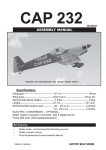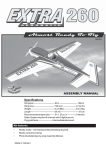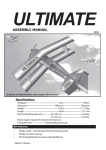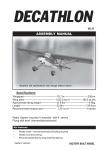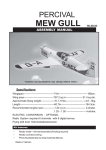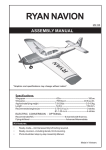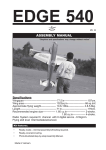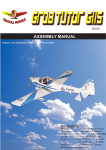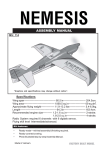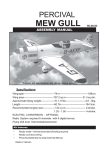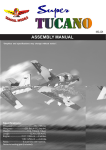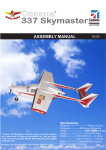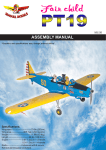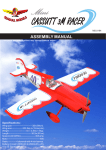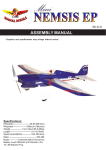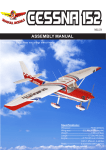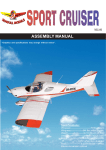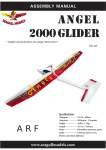Download Seagull Models PC-6 Specifications
Transcript
Pilatus PC-6 Porter ASSEMBLY MANUAL “Graphics and specifications may change without notice”. Specifications Wing span-------------------------------------- 63 in-------------------------------------- 160cm. Wing area-------------------------------------- 722.3 sq.in-------------------------46.6 sq.dm. Approximate flying weight------------------6.2-7.1 lbs----------------------------2.8-3.2kg. Length------------------------------------------ 53.7in----------------------------------- 136.3cm. Recommended engine size-------------- .46-.55cu.in---------------------------- 2-stroke. .72-.82cu.in-----------------------------4-stroke. ELECTRIC CONVERSION : OPTIONAL. Recommended R/C --------------------------------------------- 4 channels with 5 servos. Flying skill level ---------------------------------------------------- Advanced/Intermediate. Kit features. • • • Ready-made—minimal assembly & finishing required. Ready-covered covering. Photo-illustrated step-by-step Assembly Manual. Made in Vietnam. MS: 107 PC-6 _ CODE SEA 107. Instruction Manual INTRODUCTION. Thank you for choosing the PC-6 ARTF by SEAGULL MODELS. The PC-6 was designed with the intermediate/advanced sport flyer in mind. It is a low-wing scale aeroplane which is easy to fly and quick to assemble. The airframe is conventionally built using balsa, plywood and veneer to make it stronger than the average ARTF , yet the design allows the aeroplane to be kept light. You will find that most of the work has been done for you already. The pushrods are pre-made to the correct lengths, the motor mount has been fitted and the hinges are pre-installed and pinned for security. Flying the PC-6 is simply a joy. This instruction manual is designed to help you build a great flying aeroplane. Please read this manual thoroughly before starting assembly of your PC-6 . Use the parts listing below to identify all parts. WARNING. Please be aware that this aeroplane is not a toy and if assembled or used incorrectly it is capable of causing injury to people or property. WHEN YOU FLY THIS AEROPLANE YOU ASSUME ALL RISK & RESPONSIBILITY. If you are inexperienced with basic R/C flight we strongly recommend you contact your R/C supplier and join your local R/C Model Flying Club. R/C Model Flying Clubs offer a variety of training procedures designed to help the new pilot on his way to successful R/C flight. They will also be able to advise on any insurance and safety regulations that may apply. ADDITIONAL ITEMS REQUIRED. .46-.55cu.in 2-stroke engine .72-.82cu.in 4-stroke 4 channel with 5 servos Glow plug to suit engine Propeller to suit engine Protective foam rubber for radio system Silicone fuel line PARTS LISTING. FUSELAGE ASSEMBLY (1) Fuselage WING ASSEMBLY (1) Right wing (1) Left wing (1) Aluminium dihedral brace Tail section assembly TOOLS & SUPPLIES NEEDED. Thick cyanoacrylate glue 30 minute epoxy 5 minute epoxy Hand or electric drill Assorted drill bits Modelling knife Straight edge ruler 2mm ball driver Phillips head screwdriver 220 grit sandpaper 90° square or builder’s triangle Wire cutters Masking tape & T-pins Thread-lock Paper towels 2 (1) Horizontal stabilizer/ elevator halves. (1) Rudder halves. Some more parts. HARDWARE PACK COWLING Landing gear..... www.seagullmodels.com NOTE: To avoid scratching your new aeroplane we suggest that you cover your workbench with an old towel. Keep a couple of jars or bowls handy to hold the small parts after you open the bags. Please trial fit all parts. Make sure you have the correct parts and that they fit and are aligned properly before gluing! This will ensure proper assembly as the PC-6 is made from natural materials and minor adjustments may have to be made. The paint and plastic parts used in this kit are fuel proof. However, they are not tolerant of many harsh chemicals including the following: paint thinner, cyano-acrylate glue accelerator, cyanoacrylate glue de-bonder and acetone. Do not let these chemicals come in contact with the colours on the covering and the plastic parts. T- pin. Hinge. 3) Slide the wing panel on the aileron until there is only a slight gap. The hinge is now centered on the wing panel and aileron. Remove the T-pins and snug the aileron against the wing panel. A gap of 1/64” or less should be maintained between the wing panel and aileron. T- pin. Hinge. HINGING THE AILERONS. Note: The control surfaces, including the ailerons, elevators, and rudder, are prehinged with hinges installed, but the hinges are not glued in place. It is imperative that you properly adhere the hinges in place per the steps that follow using a high-quality thin C/A glue. 4)Deflect the aileron and completely saturate each hinge with thin C/A glue. The ailerons front surface should lightly contact the wing during this procedure. Ideally, when the hinges are glued in place, a 1/64” gap or less will be maintained throughout the lengh of the aileron to the wing panel hinge line. The hinge is constructed of a special Note: material that allows the C/A to wick or penetrate and distribute throughout the hinge, securely bonding it to the wood structure of the wing panel and aileron. 1) Carefully remove the aileron from one of the wing panels. Note the position of the hinges. 2) Remove each hinge from the wing panel and aileron and place a T-pin in the center of each hinge. Slide each hinge into the wing panel until the T-pin is snug against the wing panel. This will help ensure an equal amount of hinge is on either side of the hinge line when the aileron is mounted to the aileron. C/A glue. 3 PC-6 _ CODE SEA 107. 5) Turn the wing panel over and deflect the aileron in the opposite direction from the opposite side. Apply thin C/A glue to each hinge, making sure that the C/A penetrates into both the aileron and wing panel. Instruction Manual HINGING THE RUDDER. Glue the rudder hinges in place using the same techniques used to hinge the ailerons. 6) Using C/A remover/debonder and a paper towel, remove any excess C/A glue that may have accumulated on the wing or in the aileron hinge area. 7) Repeat this process with the other wing panel, securely hinging the aileron in place. 8) After both ailerons are securely hinged, firmly grasp the wing panel and aileron to make sure the hinges are securely glued and cannot be pulled out. Do this by carefully applying medium pressure, trying to separate the aileron from the wing panel. Use caution not to crush the wing structure. Apply epoxy glue. Note: Work the aileron up and down several times to “work in” the hinges and check for proper movement. HINGING THE ELEVATOR. Hinge. 4 www.seagullmodels.com AILERON CONTROL HORN Aileron control horn: See pictures below. ELEVATOR CONTROL HORN. Install the elevator control horn using the same method as with the aileron control horns. 2 sets. 2 sets. 3x40mm. 3x35mm. CONTROL HORN M3 SCREW. CONTROL HORN M3. Epoxy. ALUMINUM WASHER. ALUMINUM WASHER. Epoxy. Horizontal Stabilizer. M3 LOCK ALUMINUM WASHER. Elevator. ALUMINUM WASHER. M3 LOCK NUT. Epoxy. Horizontal Stabilizer. 18mm . Epoxy. 16mm. Wing. Elevator control. Aileron. Elevator control horn. 5 Instruction Manual PC-6 _ CODE SEA 107. RUDDER CONTROL HORN. ENGINE MOUNT INSTALLATION. Rudder control horn: Using the same tectniques used aileron control horn. See picture below. See pictures below.Make yourself the template of your engine on paper. 2 sets. M4x25mm. 1. M3x35mm. CONTROL HORN M3 SCREW. ALUMINUM WASHER. EPOXY. FUSELAGE Rudder ALUMINUM WASHER. M3 LOCK NUT. Epoxy. Horizontal Stabilizer. 16mm. Epoxy. 1. Rudder control horn. 6 www.seagullmodels.com WHEEL AND WHEEL PANTS INSTALLATION. 1) Assemble and mounting the wheel pants as shown in the following pictures. 7. 6. 3. 4. 5. 2. 1. 3 6 M3 x 15mm 5 7 M3 x 10mm 2 7 Instruction Manual PC-6 _ CODE SEA 107. 1. 4. 3) A drop of C/A glue on the wheel collar screws will help keep them from coming lose during operation. Repeat the process for the other wheel. INSTALLING THE AILERON SERVOS. Servos. Small weight. Thread. Small weight. Wing. Wing rib. Small Weight. 2mmx12mm. String. Attach the string to the servo lead and carefully thread it though the wing. 8 String. www.seagullmodels.com Wing. INSTALLING THE SWITCH. Install the switch into the precut hole in the side of fuselage. Aileron. INSTALLING THE FUSELAGE SERVO. Because the size of servos differ, you may need to adjust the size of the precut opening in the mount. The notch in the sides of the mount allow the servo lead to pass through. 1) Install the rubber grommets and brass collets onto the throttle servo. Test fit the servo into the aileron servo mount. Switch. 2) Secure the servos with the screws provided with your radio system. THROTTLE SERVO ARM INSTALLATION. Throttle servo. Install adjustable servo connector in the servo arm . Loctite secure. Adjustable Servo connector. Servo arm. 1 pcs. 9 PC-6 _ CODE SEA 107. Instruction Manual Repeat the procedure for the other wing. INSTALLING THE STOPPER ASSEMBLY. 1) Using a modeling knife, carefully cut off the rear portion of one of the 3 nylon tubes leaving 1/2” protruding from the rear of the stopper. This will be the fuel pick up tube. 2) Using a modeling knife, cut one length of silicon fuel line. Connect one end of the line to the weighted fuel pick up and the other end to the nylon pick up tube.(The silicon tube is not included). 3) Carefully bend the second nylon tube up at a 45º angle. This tube is the vent tube. A. 10 Vent tube. Fuel pick up tube. Fuel fill tube. Carefully use a lighter or heat gun to permenently set the angle of the vent tube. Important: When the stopper assembly is installed in the tank, the top of the vent tube should rest just below the top surface of the tank. It should not touch the top of the tank. 4) Test fit the stopper assembly into the tank. It may be necessary to remove some of the flashing around the tank opening using a modeling knife. If flashing is present, make sure none falls into the tank. www.seagullmodels.com 5) With the stopper assembly in place, the weighted pick-up should rest away from the rear of the tank and move freely inside the tank. The top of the vent tube should rest just below the top of the tank. It should not touch the top of the tank. Vent tube. 6) When satisfied with the alignment of the stopper assembly tighten the 3 x 20mm machine screw until the rubber stopper expands and seals the tank opening. Do not overtighten the assembly as this could cause the tank to split. Fuel fill tube. Fuel pick-up tube. FUEL TANK INSTALLATION. Blow through one of the lines to ensure the fuel lines have not become kinked inside the fuel tank compartment. Air should flow through easily. MOUNTING THE ENGINE. You should mark which tube is the vent and which is the fuel pickup when you attach fuel tubing to the tubes in the stopper. Once the tank is installed inside the fuselage, it may be difficult to determine which is which. 1) Place your engine onto the engine mount. Adjust the engine is centered of the edges of the engine case. 2) When you are satisfied with the alignment, mark the locations of the engine mounting. 3) Remove the engine. Using an drill bit, drill the mounting holes through the engine mount at the four locations marked. Fuel tank. A. C/A glue attched. 115mm. 11 Instruction Manual PC-6 _ CODE SEA 107. 4) Bolt the engine to the engine mount using the four machine screws. Double check that all the screws are tight before proceeding. 1.5mm diameter. Trim and cut. Pushrod wire. Trim and cut. Machine Screw M3x25mm. COWLING INSTALLATION. Needle valve. Machine Screw M3x10mm. . Trim and cut. 12 www.seagullmodels.com Epoxy. 4 Electric Conversion (Ep Power) (OPTION). Balsa block. 2. Blink nut. Epoxy. Epoxy. 1 2. 3. 4. 115mm. 13 Instruction Manual PC-6 _ CODE SEA 107. 4mm. 3. M3x15mm. Battery. Blink nut. Balsa block. 1. SPINNER INSTALLATION. Install the spinner backplate, propeller and spinner cone. The propeller should not touch any part of the spinner cone. If it does, use a sharp modeling knife and carefully trim away the spinner cone where the propeller comes in contact with it. M3x15mm. Electric motor. 14 www.seagullmodels.com Epoxy. INSTALLING THE HORIZONTAL STABILIZER. Epoxy. Draw center line. Remove covering. Pen. When cutting through the covering to remove it, cut with only enough pressure to only cut through the covering itself. Cutting into the balsa structure may weaken it. Remove covering. 15 Instruction Manual PC-6 _ CODE SEA 107. INSTALLING THE VERTICAL STABILIZER. Epoxy. Put the vertical stabilizer into the in the top of the horizontal fin. The bottom edge of the stabilizer should also be firmly pushed against the top of the horizontal stabilizer. Horizontal Stabilizer. Vertical Stabilizer. 90º Pen. When cutting through the covering to remove it, cut with only enough pressure to only cut through the covering itself. Cutting into the balsa structure may weaken it. Remove covering. Epoxy. 16 www.seagullmodels.com INSTALLATION THE PUSHROD. Cut. 8mm 90mm. Snap keeper. Servo arm. 90mm. 8mm. Snap keeper. Wing. ELEVATOR - RUDDER PUSHROD INSTALLATION. Aileron. Control horn. 17 Instruction Manual PC-6 _ CODE SEA 107. Repeat the procedure for the other wing. Elevator and rudder pushrods assembly follow pictures below. M2 clevis. M2 Lock nut. Attach to servo arm in fuselage. Attach to elevator - rudder control horn. Rudder. Throttle. Elevator. 18 www.seagullmodels.com MOUNTING THE TAIL WHEEL. See pictures below. M2 lock nut. Cut. Elevator pushrod. 120mm. 4. 1. 3. 2. Control horn. M2 lock nut. 1. 2. Rudder Pushrod. Metal clevis. M3x12mm. 3. 19 PC-6 _ CODE SEA 107. Instruction Manual 4. M2 lock nut. 20 Metal Clevis. www.seagullmodels.com INSTALLING THE BATTERY. 5. 4. C/A glue. 1. 3. Pin 2. Plactic screw ATTACHMENT WING-FUSELAGE. Attach the aluminium tube into fuselage. INSTALLING THE RECEIVER. Insert two wing panels as pictures below. Receiver. 5. 2. 1. .3. 4. C/A glue. Wing bolt. Cut. 21 Instruction Manual PC-6 _ CODE SEA 107. Plastic Screw. . Plastic screw. 22 M3x6mm. www.seagullmodels.com BALANCING. 1) It is critical that your airplane be balanced correctly. Improper balance will cause your plane to lose control and crash. The center of gravity is locate 8cm back from the leading edge of the wing, measured at wing tip. 2) If the nose of the plane falls, the plane is nose heavy. To correct this first move the battery pack further back in the fuselage. If this is not possible or does not correct it, stick small amounts of lead weight on the fuselage sides under the horizontal stabilizer. If the tail of the plane falls, the plane is tail heavy. To correct this, move the battery and receiver forward orif this is not possible, stick weight onto the firewall.When balanced correctly, the airplane should sit level or slightly nose down when you lift it up with your fingers. C) Check the elevator first. Pull back on the elevator stick. The elevator halves should move up. If it they do not, flip the servo reversing switch on your transmitter to change the direction. D) Check the rudder. Looking from behind the airplane, move the rudder stick to the right. The rudder should move to the right. If it does not, flip the servo reversing switch on your transmitter to change the direction. E) Check the throttle. Moving the throttle stick forward should open the carburetor barrel. If it does not, flip the servo reversing switch on your transmitter to change the direction. F) From behind the airplane, look at the aileron on the right wing half. Move the aileron stick to the right. The right aileron should move up and the other aileron should move down. If it does not, flip the servo reversing switch on your transmitter to change the direction. PREFLIGHT CHECK. FLIGHT PREPARATION. 8cm. 1) Completely charge your transmitter and receiver batteries before your first day of flying. 2) Check every bolt and every glue joint in the PC-6 to ensure that everything is tight and well bonded. 3) Double check the balance of the airplane. Do this with the fuel tank empty. 4) Check the control surfaces. All should move in the correct direction and not bind in any way. CONTROL THROWS. Ailerons: 10 Low rate 12 High rate Elevator: 8 Low rate 10 High rate Rudder: 15 Low rate 20 High rate FLIGHT PREPARATION. A) Check the operation and direction of the elevator, rudder, ailerons and throttle. B) Plug in your radio system per the manufacturer's instructions and turn everything on. 5) If your radio transmitter is equipped with dual rate switches double check that they are on the low rate setting for your first few flights. 6) Check to ensure the control surfaces are moving the proper amount for both low and high rate settings. 7) Check the receiver antenna. It should be fully extended and not coiled up inside the fuselage. 8) Properly balance the propeller. An out of balance propeller will cause excessive vibration which could lead to engine and/or airframe failure. We wish you many safe and enjoyable flights with your PC-6 . 23























